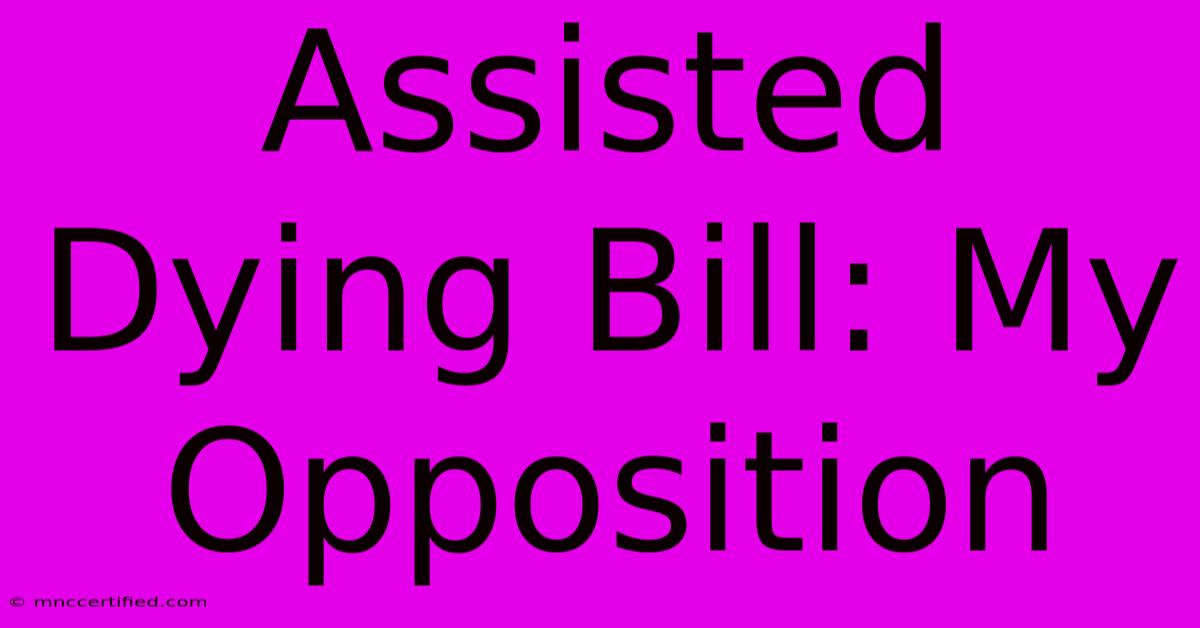Assisted Dying Bill: My Opposition

Table of Contents
Assisted Dying Bill: My Opposition
The debate surrounding assisted dying is complex and deeply emotional. While I understand the compassion behind proposals for assisted dying legislation, I remain firmly opposed to its implementation. This opposition stems not from a lack of empathy for those suffering, but from a profound concern for the potential consequences and inherent vulnerabilities such a law creates.
The Slippery Slope Argument: Protecting the Vulnerable
One of my primary concerns is the potential for a "slippery slope." While proponents argue for strict safeguards and limitations, history shows how easily such safeguards can erode. Starting with narrowly defined criteria for eligibility – terminal illness, unbearable suffering, and informed consent – the definition of "terminal" and "unbearable" can become progressively broader over time. This opens the door to coercion, particularly for vulnerable populations like the elderly, disabled, and those experiencing mental health crises. These individuals may feel pressured to end their lives, not because they truly wish to die, but because they feel like a burden on their families or society. Protecting the most vulnerable is paramount, and an assisted dying bill risks undermining that protection.
The Role of Palliative Care: Addressing Suffering
Another crucial aspect often overlooked is the advancement of palliative care. Palliative care focuses on providing comfort and support to patients with serious illnesses, aiming to improve their quality of life. It addresses pain, symptoms, and emotional distress, offering a holistic approach to end-of-life care. While not a cure-all, significant improvements in palliative care have demonstrated the ability to alleviate suffering in many cases. Investing in and expanding access to high-quality palliative care should be prioritized over legalizing assisted dying. This approach respects the dignity of life while actively addressing the suffering that motivates the assisted dying debate.
Concerns about Informed Consent and Coercion
The requirement of "informed consent" is also a point of contention. Can we truly guarantee that individuals facing immense physical and emotional pain are making truly autonomous decisions? Depression, anxiety, and the fear of being a burden can significantly impair judgment. Furthermore, subtle or overt pressure from family members facing financial or emotional strain could influence a patient's decision, leading to involuntary euthanasia. The potential for coercion, even unintentional, undermines the very foundation of informed consent.
The Ethical Implications: The Sanctity of Life
Beyond the practical concerns, my opposition is rooted in a fundamental ethical principle: the sanctity of human life. While the suffering of terminally ill individuals is undeniably heartbreaking, legalizing assisted dying sets a dangerous precedent. It devalues human life by suggesting that certain lives are less worthy of protection than others. This principle, while deeply held by many, forms a core part of my opposition to assisted dying legislation.
Focusing on Support and Compassion
Instead of focusing on ending life, we should concentrate our efforts on improving the quality of life for those facing serious illness. This includes bolstering palliative care services, enhancing support for families, and fostering a culture of compassion and respect for all individuals, regardless of their health status. We must create a society that values life at every stage, providing support and care to those who need it most.
This is not to say that the issue is simple or that there aren't valid arguments in favor of assisted dying. However, after careful consideration of the potential risks and ethical implications, I remain unconvinced that legalizing assisted dying is the right course of action. We need a society that values life, supports the dying, and focuses on compassionate care, rather than facilitating death.
Keywords: Assisted Dying, Assisted Suicide, Euthanasia, Palliative Care, End-of-Life Care, Informed Consent, Vulnerable Populations, Slippery Slope, Ethical Implications, Sanctity of Life, Opposition, Debate
Off-page SEO Strategies:
- Guest Blogging: Write guest posts on relevant blogs and websites discussing palliative care, end-of-life issues, and ethical considerations.
- Social Media Engagement: Participate in relevant discussions on social media platforms, sharing your perspective respectfully and engaging with others.
- Link Building: Seek out opportunities to have your article linked to from other reputable websites and blogs covering similar topics.
- Community Involvement: Participate in local discussions and events concerning end-of-life care and related issues.
This comprehensive approach combines strong on-page SEO with a proactive off-page strategy to maximize the article's visibility and impact. Remember to consistently update and improve the content based on performance data and feedback.

Thank you for visiting our website wich cover about Assisted Dying Bill: My Opposition. We hope the information provided has been useful to you. Feel free to contact us if you have any questions or need further assistance. See you next time and dont miss to bookmark.
Featured Posts
-
Air Pods Max Black Friday 500 Usb C Deals
Nov 30, 2024
-
Is A Probate Bond Refundable
Nov 30, 2024
-
Bonding An Above Ground Pool
Nov 30, 2024
-
15 Top Apple Black Friday Deals 2024
Nov 30, 2024
-
Live Sheffield United Vs Sunderland Score
Nov 30, 2024